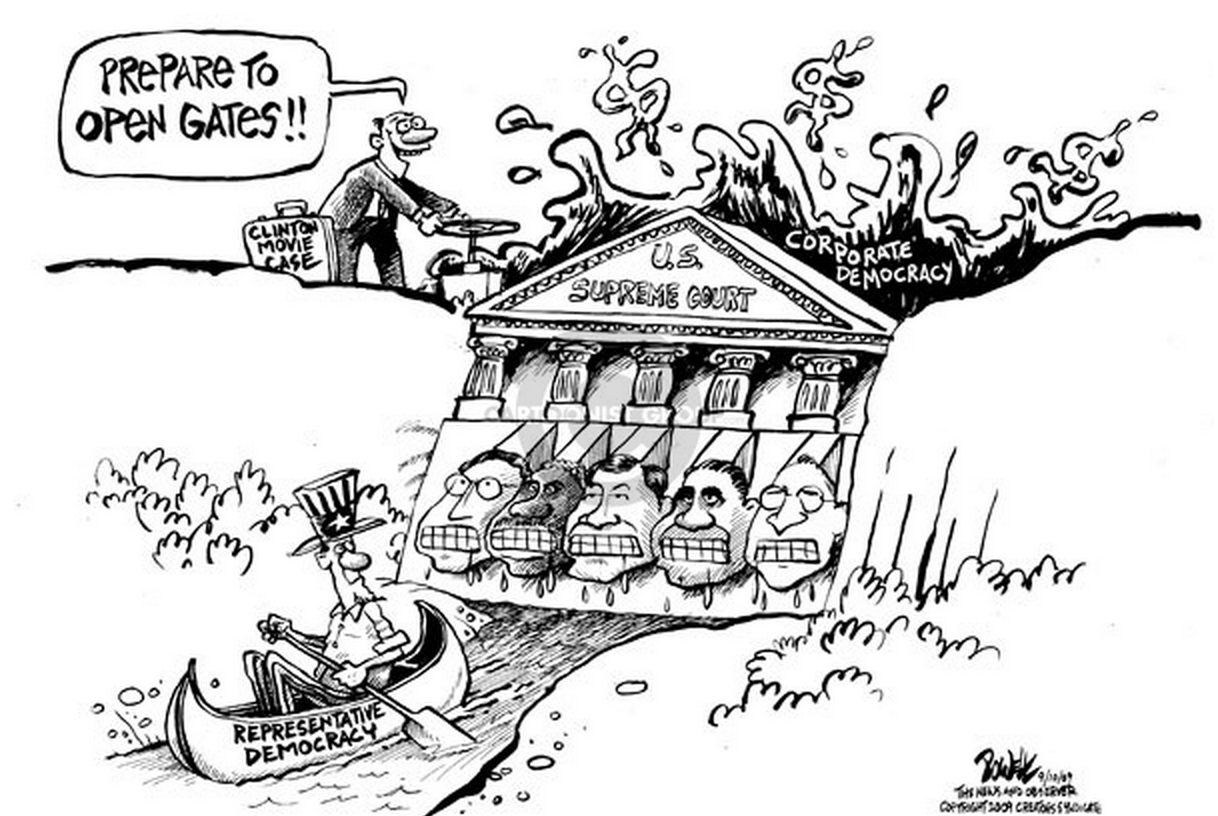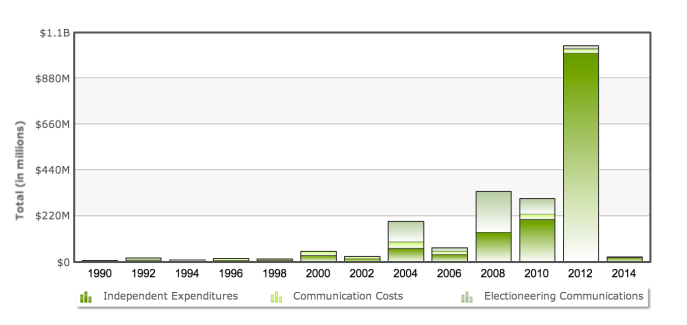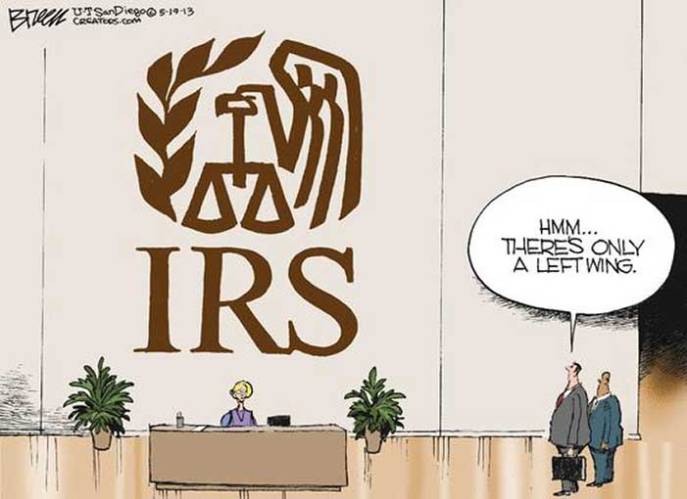Campaign finance reform has become a hot button issue recently as independent campaign expenditures have skyrocketed after the 2010 Citizen’s United v. FEC. As seen in the graph below independent expenditures in 2012 were almost 5 times the amount spent in 2010.
Total Outside Spending by Election Cycle, Excluding Party Committees | OpenSecrets
Source: OpenSecrets
Also, from 2010 to 2012 there was a large decrease in money spent on electioneering communications as it was easier for money to flow through Super PACs, than through the regulated electioneering communications process. So how does this effect politics?
Looking at historical data, a study done by Bob Biersack for the Center of Responsive Politics shows that nine out of ten House races are won by the candidates who spends more money [1].
However, many factors go into an election and it is hard to narrow it down to one specific factor such as amount spent. Andrew Therriault, a post-doctorate fellow, concisely states one reason why,
Despite these concerns, in most cases the basic fact is that candidates who raise more money, have a better chance of winning. Therefore, there is incentive for candidates to raise as much money as possible. With this incentive it seems that the large corporations, unions, and wealthy individuals through supporting Super PACs could have a huge influence on policy. Before the Citizens United case, there were far more greater restrictions on spending. Now Super PACs have the power to invest unlimited amounts of money, through independent expenditures, towards a candidate. This money can be used to run campaign ads and spend money for activities such as canvassing, which have been shown to positively effect voter turnout [2].
However, there hypothetically is a major roadblock between Super PACS and the candidate, the rules state that candidates can have no connection and cannot coordinate with a Super PAC that supports them . Further, these Super PACs cannot directly contribute and can only spend money on independent expenditures, and they must also disclose all their donations. While these rules sound reasonable to prevent large influences from corporate and union money flowing into campaigns, in reality it is not so simple. For instance, Restore Our Future was founded in 2010, which raised over $140 million to support Romney, was founded by Carl Forti, Romney’s 2008 political director [3]. There is supposed to be no coordination between Super PACs and candidates, however, if Romney’s previous political director is running the Super PAC, there is an implied relationship between the candidate and the Super PAC.
With that in mind, there has been a recent movement towards reviewing and reforming campaign finance in America. Stephen Colbert has brilliantly made a mockery of the entire campaign finance process as he makes his own Super PAC for personal use as seen in the video below.
In addition to the Super PAC problem, more recently there has been issues with 501(c)(4) groups as these groups do not have to disclose where the sources of their funds [4]. This money that is from undisclosed donors is called “dark money” and consisted of over $300 million of spending in the 2012 election [4]. There are inherent dangers for not knowing who is funding what candidates and the motives behind this funding, which is causing for a push to eradicate these so-called social welfare groups from the tax code if they make political independent expenditures. To truly understand how easily corrupt the 501(c)(4) groups can be become watch this video, as Stephen Colbert legally transfers all of his Super PAC money into a 501(c)(4) (his second one) in order to eliminate all necessary disclosures.
In most recent weeks, the Obama administration has proposed new reforms that would largely weaken the influence of these 501(c)(4) groups [5]. The administration is coming out with new guidance that would specify more clearly what are political activities and what are social welfare activities [5]. Currently, these 501(c)(4) groups must spend at least 51 percent of their funds on “social welfare” activities, but these activities are left vague and therefore some groups have been known to classify what easily could be considered political activities, as social welfare activities.
These 501(c)(4) groups came under scrutiny earlier this year, when IRS employees were accused of “targeting” politically active 501(c)(4) groups in order to see if they were complying to their social welfare requirements [5]. While in one sense it could be viewed that IRS employees were trying to comb through 501(c)(4) groups for political groups in order to make sure they were abiding to the law, Republicans spun the story in order to make it seem that the Obama administration was actively seeking to hunt conservative groups because of their political views.
Source: Steve Breen/U.S. News
Applying what we learned in class, this tactic by the Republicans was very shrewd because not only did they damage the Obama administration reputation, Republicans also took regulatory pressure off of the 501(c)(4) groups which provide them with a great deal of funding.
With the latest push for these regulations, now that the IRS scandal has passed, Democrats may have something to benefit from less 501(c)(4) groups spending money. While both political parties benefit from the 501(c)(4) groups, the fact that the Obama administration is vying for more regulation could hint that Republicans are actually benefitting more from these groups. On the other hand, the ideological standpoint that “dark money” should not be allowed to influence elections could be the driving factor behind the Obama administration’s decision. This regulation will most likely be the short-term focus of campaign finance reform in the United States.
Sources:
[1] Biersack, Bob. “The Big Spender Always Wins?” Opensecrets.org. Center For Responsive Politics, 11 Jan. 2012. Web. 3 Dec. 2013.<http://www.opensecrets.org/news/2012/01/big-spender-always-wins.html>.
[2] Tucker, Joshua. “Does Money Affect Election Outcomes in US Politics? A Quick Review of the Literature.” Themonkeycage.org. The Monkey Cage, 4 Nov. 2011. Web. 3 Dec. 2013. <http://themonkeycage.org/2011/11/04/does-money-affect-election-outcomes-in-us-politics-a-quick-review-of-the-literature/>.
[3] “Restore Our Future.” Opensecrets.org. Center For Responsive Politics. Web. 3 Dec. 2013. <http://www.opensecrets.org/orgs/summary.php?id=D000064429>.
[4] Blumenthal, Paul. “Proposed IRS ‘Dark Money’ Rules Spur Congressman To Drop Lawsuit.” The Huffington Post. TheHuffingtonPost.com, 06 Dec. 2013. Web. 14 Dec. 2013. <http://www.huffingtonpost.com/2013/12/06/dark-money-irs_n_4399398.html>.
[5] Gold, Matea. “Obama Administration Proposes New Rule Curtailing Political Activities by Nonprofit Groups.” Washingtonpost.com. Washington Post, 26 Nov. 2013. Web. 12 Dec. 2013. <http://www.washingtonpost.com/blogs/post-politics/wp/2013/11/26/obama-administration-proposes-new-rule-curtailing-political-activities-by-nonprofit-groups/>.


